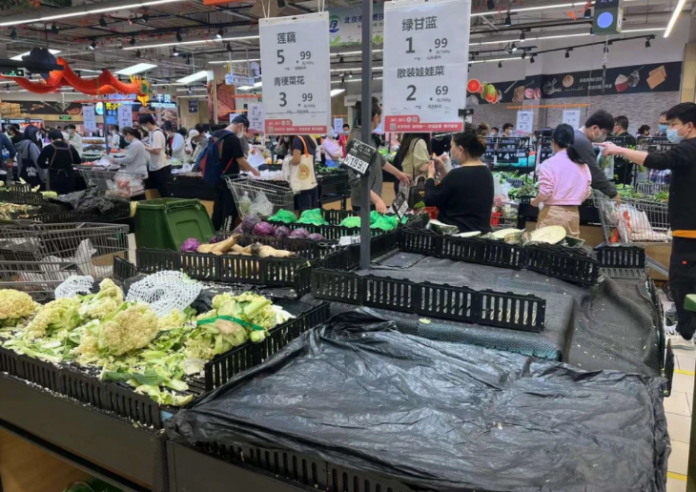On April 24, driven by the mentality of “I don’t know why I want to stock up, but if Idon’t stock up, I won’t be secure”, and people joined the army of grabbing vegetables one after another.

On the afternoon of the same day, according to a press conference on the prevention and control of the COVID-19 pandemic in Beijing, from 16:00 on April 23 to 16:00 on the 24th, Beijing added 21 new cases of local COVID-19 infection.
The meeting also reminded the public that from the 25th, normal nucleic acid testing will be carried out in Chaoyang District, Beijing.
In fact, just two days after Beijing “picked the stars” on the 23rd, scattered cases began to appear one after another, which aroused the vigilance of some citizens.
Guo Jia, the operation director of the Daily Youxian Beijing Region, revealed that on the 23rd, orders on the Daily Youxian app increased by about 3 times year-on-year; after Beijing announced the latest changes in the pandemic on the 24th, the increase quickly rose to 6 times.

On the afternoon of the 24th, many citizens began to “passionately” place orders on the fresh food app, but the capacity was quickly wiped out.
On the Jingdong APP, rice noodles, instant food, large barrels of alcohol, N95 masks, rolling papers, and other common items were also quickly sold out.
As of the evening of April 26, many commonly used products in Jingdong’s Beijing warehouse were shown to be delivered after April 29.

On the evening of April 24, office workers and middle-aged and elderly people flocked to major supermarkets in Beijing for offline purchases.
Xiaoyu, who works in a large factory in Haidian, rushed to Yonghui Supermarket in Changping District after getting off work. She saw that there were still fruits and green leafy vegetables left, while onions, potatoes, baby vegetables, tomatoes, and other vegetables that were resistant to storage were indistinguishable.” sweep”.
People’s shopping carts are full of pork, eggs, and convenience foods, and there are people loading cartons with boxes of alcohol. Xiaoyu wrote four words on Wechat: “shivering”.

That night, major supermarkets and fresh food apps in Beijing, including Wumart, Carrefour, and Yonghui, announced that they would extend their business hours until late at night.
Xiaoyu saw a lot of neatly styled pictures on Wechat: various strategies for hoarding vegetables, stuffed shopping carts, or emptied shelves in supermarkets.

“Until now, I can’t believe that I actually spent nearly 7,000 yuan to buy things in the supermarket. My wife said I was really obsessed!” Mr. Lin, who lives in Chaoyang, still thinks his actions are incredible.
Mr. Lin has been fascinated by the idea of stockpiling goods by relatives and friends in Shanghai, and there are several different versions of various material forms.
Especially after watching the press conference on the same day, Mr. Lin panicked completely after a friend received a short message from a friend around him, and the word “hoarding goods” became a subconscious conditioned reflex.
“I see that the supermarket is full of people, and I don’t care about the shopping list. I can take what others take. I haven’t eaten instant noodles, mustard, ham, luncheon meat, and canned food for five or six years. The prepared meat dishes were put into the shopping cart together,” said Mr. Lin.

To Mr. Lin’s regret and surprise, although the Nongguangli community in Chaoyang District currently requires residents to work from home and not leave the area, on the evening of the 25th, their family received a free vegetable package from the community, including lettuce, cabbage, Tomatoes, cucumbers, peppers, and potatoes, etc.
“The whole family started to eat vegetables, otherwise, most of the vegetables stored on Sunday would have to be thrown away. Anxiety really kills people.” Mr. Lin said.
At the Beijing pandemic Prevention and Control Press Conference on April 25, Zhao Weidong, deputy director of the Beijing Municipal Bureau of Commerce, said: Beijing’s refined grain and refined oil transactions are stable, the reserves are sufficient, and the reserves can meet the consumption needs of Beijing residents for 30 days. In general, the supply of various daily necessities in Beijing is sufficient and stable, and the supply is guaranteed.

